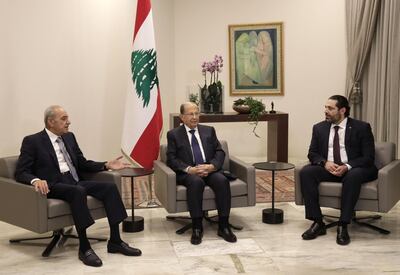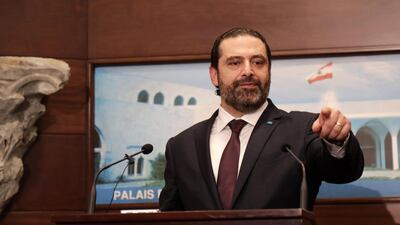After 252 days, Lebanon’s Prime Minister Saad Hariri on Thursday announced that he had formed a new government ending months of deadlock that paralysed the state and brought it to the edge of financial ruin.
Apologising to the Lebanese people for the delay, Mr Hariri said that a condition for forming government was that ministers would cooperate and to work together to pass needed reforms and laws.
“The time of treatment with painkillers is over. No one can put their head in the sand any more. Matters are as clear as the sun. All the problems are known and the causes of the corruption and waste and administrative deficiency are also known,” he said.
“Lebanese are living in concern about the economic situation,” he said, adding that the government’s work could not wait.
Earlier this month, Moody’s ratings agency downgraded Lebanese bonds to junk status given the crippling effect that the impasse over government positions was having on the economy and the ability of the country to continue servicing its debt.
But Lebanese bond prices rallied on the news that Mr Hariri and Speaker Nabih Berri were headed to Baabda Palace to meet with President Michel Aoun to announce the new government. Bonds with a 2037 valuation jumped by 4.3 cents to the highest point since August last year.
Mr Hariri said that government’s priority would be the economy with reforms needed to prevent financial disaster and to unlock billions in aid pledged last year in the run-up to the election to improve infrastructure and basic services. The prolonged cabinet formation has risked Lebanon being able to rely on the money that requires dozens of new rules and regulations to convince donor states that the country was making the first steps.
As names started to come out it became clear that at least one sticking point had been ruled in favour of Hezbollah, the powerful Iranian political and military force. US officials in Beirut have previously told Mr Hariri that appointing a Hezbollah aligned minister to run the health ministry would be opposed and could lead to the country running into sanctions on the outlawed group.
Hezbollah picked Doctor Jamil Jabak to lead the health ministry. By picking the health minister, Hezbollah will be moving beyond the more marginal role it has played in past governments: the ministry has the fourth-biggest budget in the state apparatus, the outgoing minister has said.
Hezbollah control over the Health Ministry could have implications for foreign aid, as it is considered a terrorist organisation by the United States and some other Western and Arab countries. The US has put new sanctions on the group as part of a campaign against Iran.
In October, Mr Hariri said he had no personal objection to Hezbollah taking the health portfolio, but he had concerns that if they did so the World Bank or other international bodies could stop aid to the health ministry.
Though picked by Hezbollah, sources have said Dr Jabak is not a member of the heavily armed, Iran-backed group.
Of the other announced names, the powerful Interior Minister Nohad Machnouk has been replaced by his Future Movement colleague Raya Al Hasan. She last served in government as finance minister between 2009 and 2011 and was the first woman to hold the position.
The previous Lebanese government only had one woman, Inaya Ezeddine of the Amal Movement who served as minister of state for development. Ms Al Hassan is the highest-placed women to be appointed to government since she held the finance ministry.

Lebanese government formation is regularly a prolonged process and months can often pass with no deal. The country went for two years without a government under President Michel Sleiman and it was only finally formed a month before the premier ended his term. There was then another two-year gap until Mr Aoun was elected.
The government is usually made up of representatives from the major parties, with each lobbying for different interests and desires in terms of positions. The so-called sovereign portfolios – including finance, defence, interior and foreign – are the most sought after.


